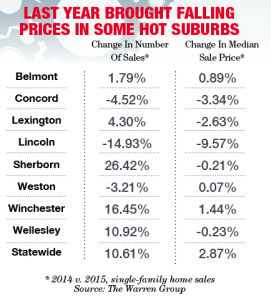Greater Boston’s sky-high home prices may be finally peaking after an epic run-up that has seen values reach – and in some cases blow past – records set during the bubble years.
Then again, maybe they are just taking a breather before rocketing to even more insane heights.
The real estate market inside the 495 beltway is at a crossroads, with prices slowing and in some cases flattening out over the past few months, even as sales go bonkers.
And with the spring market here, we shall soon have at least a partial answer to whether the slowing prices of late are a real trend or just a passing phase.
Svenja Gudell, chief economist at Zillow, is in the slowdown camp. After watching Boston area home prices values rise yet again in 2015, Gudell is looking ahead to a less lofty 2016. She’s forecasting a relatively measly 1.5 percent increase.
Gudell sees the slowdown kicking in the latter half of the year after the spring market has shot its bolt. Why? She argues homes in the Boston area are simply getting too expensive, with price increases outpacing what buyers can afford.
“I do think at some point we are going to start pushing up against the fact that it is actually quite expensive to buy a home,” she said. “Even smaller increases will start to deter some homebuyers.”

Scott Van Voorhis
There are certainly numbers to back up the slowdown view.
While pending sales across Massachusetts were up in February by a whopping 75 percent compared to last year – recall last February’s Siberian interlude – median home and condo prices fell 2.3 and 2.8 percent respectively, the Massachusetts Association of Realtors reports.
Home prices have hardly been on a tear over the last few months, either, given what’s happened over the last few years.
The median home price in Massachusetts edged down half a percent in January, to $320,000, while condo prices fell 3 percent, to $290,875, according to The Warren Group, publisher of Banker & Tradesman. Overall, home prices across the state rose a relatively modest less than 3 percent in 2016.
Moreover, there are also signs that prices have finally hit a ceiling in some of the Boston area’s toniest suburbs.
After year after year of steady, sometimes double-digit appreciation, home prices actually fell last year in blue chip towns like Weston, Lincoln, Lexington, Concord and Sherborn, as well as Cohasset on the South Shore. Prices basically flat-lined in Belmont, Winchester and Wellesley.
Everything In Moderation
Yet could this all be wishful thinking, a vain hope that long-suffering Boston-area buyers may finally get a break?
Annie Blatz, president of the Massachusetts Association of Realtors, said she too is encouraged by what she sees as a “moderating” trend in home prices. It’s certainly good for business. Steady but modest increases in home prices a lot easier for homebuyers to stomach, she noted.
“We are always happy with moderation,” Blatz said.
That said, she wisely declined to take out her crystal ball, declining to offer a prediction on whether the new moderation in pricing will survive the typically torrid spring market.
Blatz noted that inventory – the state’s now chronic dearth of listings – remains a major problem.
The number of homes on the market has been on the decline for years, with a 20 percent decline in January compared to the start  of 2015. Low supply plus high demand typically equal price increases, whether it’s widgets or homes.
of 2015. Low supply plus high demand typically equal price increases, whether it’s widgets or homes.
The long-standing logjam in new residential construction is a big culprit; the Greater Boston area now has decades of underbuilding to catch up from.
Sure, there are certainly a lot of new towers taking shape on Boston’s skyline, but most have been high-end apartments, with a smattering of ultra-high-end condos.
The suburbs have seen their own mini apartment boom, but new single-family homes are few and far between.
And while some of the suburbs may be seeing prices cool, hotspots like Cambridge and Somerville – not to mention several Boston neighborhoods – are likely to lead to another round of big increases in 2016.
Here again, the shortage of listings is a key factor, notes Sara Rosenfeld, a veteran Coldwell Banker broker who has been selling real estate in Somerville since the early 1980s.
“Considering the number of buyers out there and considering the lack of inventory, the pent-up demand is going to fuel this market for many months,” she said.








